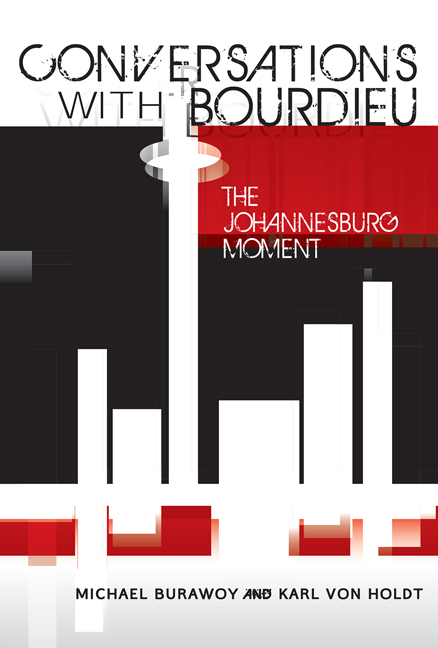Book contents
- Frontmatter
- Contents
- Abbreviations and acronyms
- Preface
- Prologue The Johannesburg Moment
- Acknowledgements
- CONVERSATION 1 SOCIOLOGY AS A COMBAT SPORT
- CONVERSATION 2 Theory and Practice
- CONVERSATION 3 CULTURAL DOMINATION
- CONVERSATION 4 COLONIALISM AND REVOLUTION
- CONVERSATION 5 PEDAGOGY OF THE OPPRESSED
- Freire Meets Bourdieu
- Discipline
- CONVERSATION 6 THE ANTINOMIES OF FEMINISM
- CONVERSATION 7 INTELLECTUALS AND THEIR PUBLICS
- CONVERSATION 8 MANUFACTURING DISSENT
- Epilogue Travelling Theory
- Bibliography
- Index
Freire Meets Bourdieu
from CONVERSATION 5 - PEDAGOGY OF THE OPPRESSED
Published online by Cambridge University Press: 20 April 2018
- Frontmatter
- Contents
- Abbreviations and acronyms
- Preface
- Prologue The Johannesburg Moment
- Acknowledgements
- CONVERSATION 1 SOCIOLOGY AS A COMBAT SPORT
- CONVERSATION 2 Theory and Practice
- CONVERSATION 3 CULTURAL DOMINATION
- CONVERSATION 4 COLONIALISM AND REVOLUTION
- CONVERSATION 5 PEDAGOGY OF THE OPPRESSED
- Freire Meets Bourdieu
- Discipline
- CONVERSATION 6 THE ANTINOMIES OF FEMINISM
- CONVERSATION 7 INTELLECTUALS AND THEIR PUBLICS
- CONVERSATION 8 MANUFACTURING DISSENT
- Epilogue Travelling Theory
- Bibliography
- Index
Summary
Thus, in a society in which the obtaining of social privileges depends more and more closely on possession of academic credentials, the School does not only have the function of ensuring discreet succession to a bourgeois estate which can no longer be transmitted directly and openly. This privileged instrument of the bourgeois sociodicy which confers on the privileged the supreme privilege of not seeing themselves as privileged manages the more easily to convince the disinherited that they owe their scholastic and social destiny to their lack of gifts or merits, because in matters of culture absolute dispossession excludes awareness of being dispossessed.
Bourdieu and Passeron (1977 [1970]: 210)For Bourdieu, education is symbolic domination par excellence. In a society where the dominant class can no longer invoke rights of blood to pass on their inheritance nor appeal to ascetic virtue as a justification of success, academic certification becomes the vehicle to justify and transmit its domination. Education attests and consecrates the merits and gift of the bourgeoisie, while concealing their distinction as an outgrowth of their privilege – concealing it, that is, not only from themselves, but also from the dominated, who see themselves as undeserving because unmeritorious. Reproduction, which brought Bourdieu and Passeron into the public eye both in France and abroad, offers a deeply pessimistic account of the role of education in reproducing domination through simultaneously privileging and hiding the cultural capital inherited by the dominant. It is designed to dispel illusions that schooling can be a vehicle of social transformation, although that still didn't stop Bourdieu using his place in the education world to advocate change.
Paulo Freire's Pedagogy of the Oppressed – the originating, most popular text of critical pedagogy – appeared in 1970, the same year that Reproduction was published in France. Neither makes any reference to the other, yet they both embark from a similar criticism of conventional pedagogy and its optimism about formal education's progressive contribution to social change. Freire also sets out from the assumption that the dominated have internalised their oppression, and that this domination is reinforced through a ‘banking’ system of education in which teachers pour knowledge into the supposedly empty minds of their students. There is, however, an alternative pedagogy, Freire argues, based on dialogue between teacher and student around problems originating with the latter.
- Type
- Chapter
- Information
- Conversations with BourdieuThe Johannesburg Moment, pp. 103 - 118Publisher: Wits University PressPrint publication year: 2012

